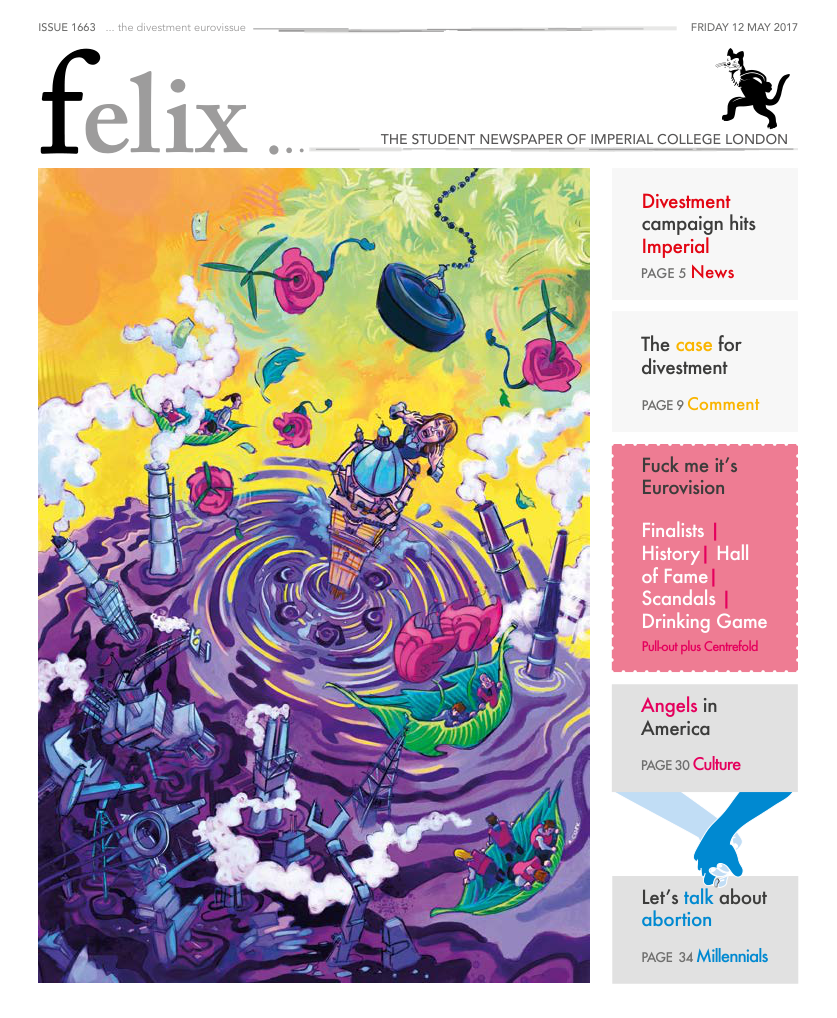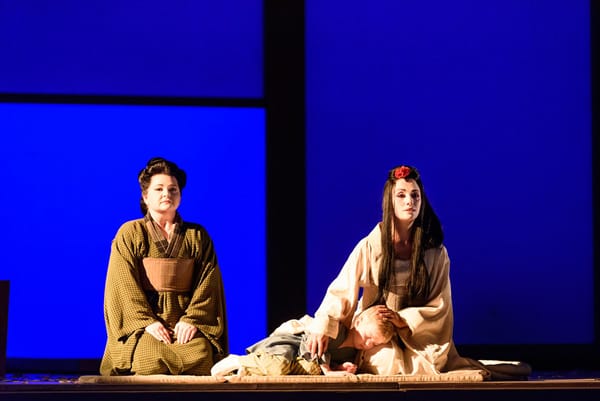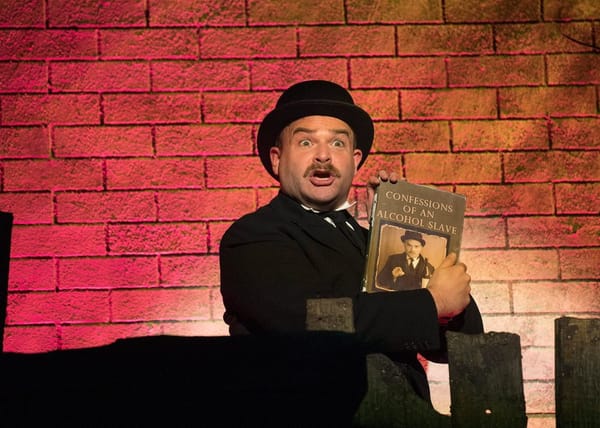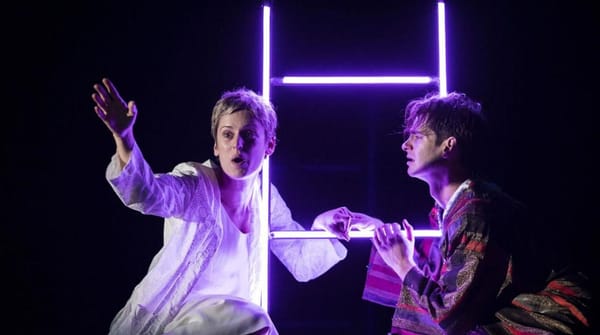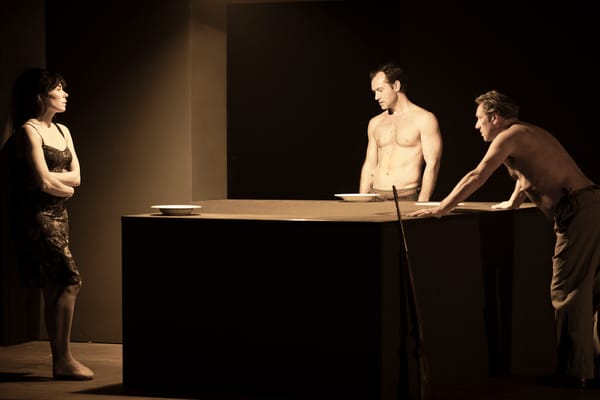Angels in America
Angels in America is on at the National Theatre. Normal tickets are sold out but hundred of £20 tickets are being released by ballot. NT Live will begin streaming performances from the 20th of July.
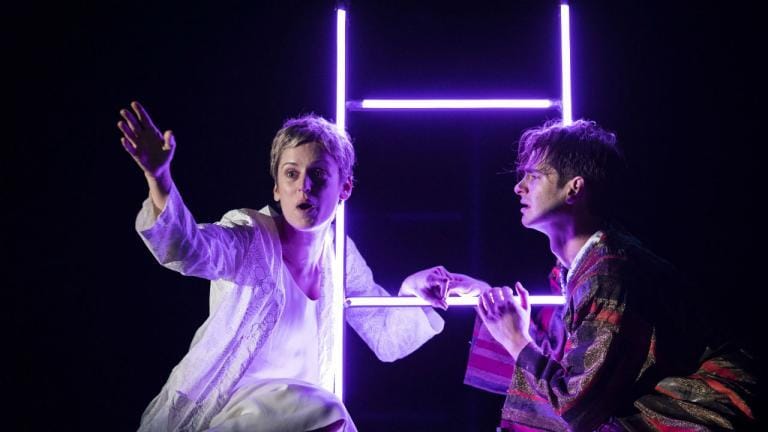
A gay fantasia on national themes” is the label Tony Kushner gave his play Angels in America, which is being staged at the National theatre for the first time since the 90s; and what a fantasia it is. Grounded in 1980s New York, the action sprawls across reality and delusion, from Salt Lake City to Washington DC, from Antarctica to Heaven, dancing on the edge of utter madness but never stumbling. Tony Kushner’s writing is bold, profound, and urgent, with frequent bright sparks of comedic brilliance. Even on the occasions the script spirals into dense segments of over-arching philosophising, this cast and crew make it soar.
Director Marianne Elliot, who in 2011 won a Tony Award for War Horse, has created a theatrical spectacle to be marvelled over. Columns of fire erupt inches from the audience, hospital rooms rise from the bowels of the stage, neon shining ladders are thrown down from Heaven, New York apartments transfigure themselves into the snow drifts of Antarctica and back again all under a deconstructed space-age cathedral dome. Special mention go to production designers Finn Caldwell and Nick Barnes who have fashioned The Angel's “steel grey wings” from huge feathered contraptions that are operated by balletic puppeteers.
As magnificent as the staging is, it never overshadows the acting. Nathan Lane is incandescent as Roy Cohn, a real-life lawyer who desperately tries to deny his homosexuality even as he slowly dies from Aids. His energy never wanes, even across hours of turning purple in the face from bellowing Malcolm Tucker-esque profanity at anyone who will listen. In any other production, perhaps Lane could’ve stolen the show but here he is given a run for his money from his castmates, which seem to be giving the performance of their lives.
Denise Gough playing Harper Pitt, a woman who is verging constantly on the edge of psychosis, is funny, heart-breaking and ultimately uplifting. Nathan Stewart-Jarett, familiar from Channel 4’s Misfits lights up the stage as the witty, warm and wise Belize, often the sole voice of reason amongst a group of characters where each is more neurotic than the last. Amanda Lawrence as The Angel is truly magnificent, filled with the manifest dignity that Kushner demands of the role in the stage notes to the play.
As for Andrew Garfield, who plays Prior Walter, a drag queen who finds his life irrevocably changed when he finds a Karposi’s Sarcoma lesion on his arm, this is surely a career-defining performance. He is impossible to look away from even when his character slips out of the spotlight. It’s a tender, camp, humorous performance which matures over the course of the play. There are moments early on where the characterization drifts ever so slightly into the realm of stereotype, but perhaps this too, is intended – after all, Angels in America is just as much about types of people as it is about living, breathing humans.
At its core, Kushner’s polemic is a searing account of the Aids crisis, a modern plague, and the destruction it wreaked over the lives of young gay men who found themselves as patients with terminal diagnoses or the carers of dying friends and lovers in their 20s and 30s. Recent healthcare reforms in America have fuelled fears anew that the new administration will mark a return of government inaction as epidemics rage on. Much of the political art created in the shadow of Reagan and Thatcherite politics seems all too relevant now. One need not delve too deep to look for parallels; the morally bankrupt, corrupt, Roy Cohn was Donald Trump’s legal advisor.
Angels in America rages against the hard-line religious conservative movement that sees ‘progress’ as a dirty word. Yet, whilst its nearest literary relative, Larry Kramer’s The Normal Heart, also about the Aids crisis in New York, is sustained on a steady stream of righteous anger, Kushner’s Angels ultimately takes a more hopeful stance. It is an ode, as the Thomas Lux poem goes, to the unbroken world that is coming.
On press night, the end of the second part, Perestroika, received a thunderous standing ovation. It was in no small part a reaction to the final scene which Andrew Garfield makes magical in a way that is difficult to convey. Speaking to the Hollywood Reporter at the Oscar Actors Roundtable earlier in the year, Garfield spoke eloquently of the importance of creating art that speaks to marginalised communities who are desperately looking for media that represents them, that recognises them: Angels in America is one of those rare gems. Go and see it.

